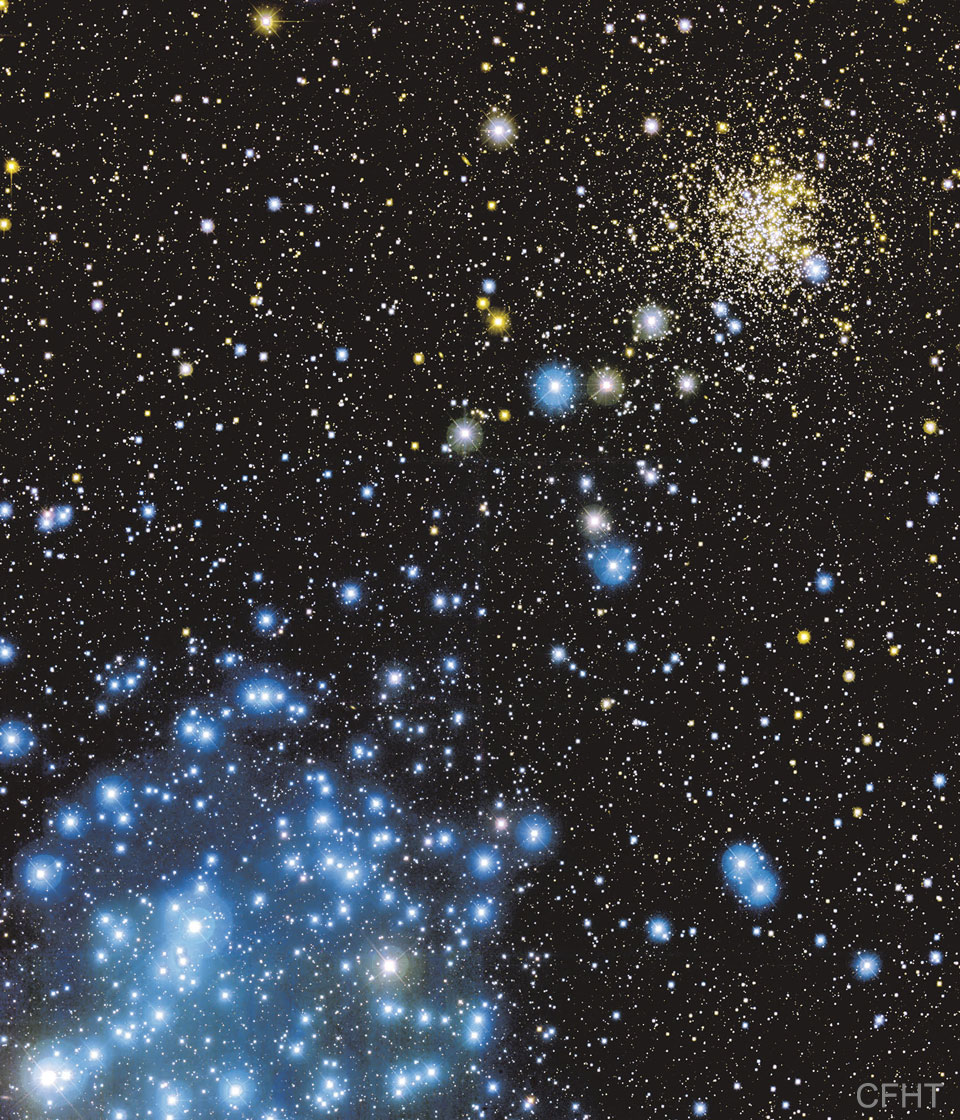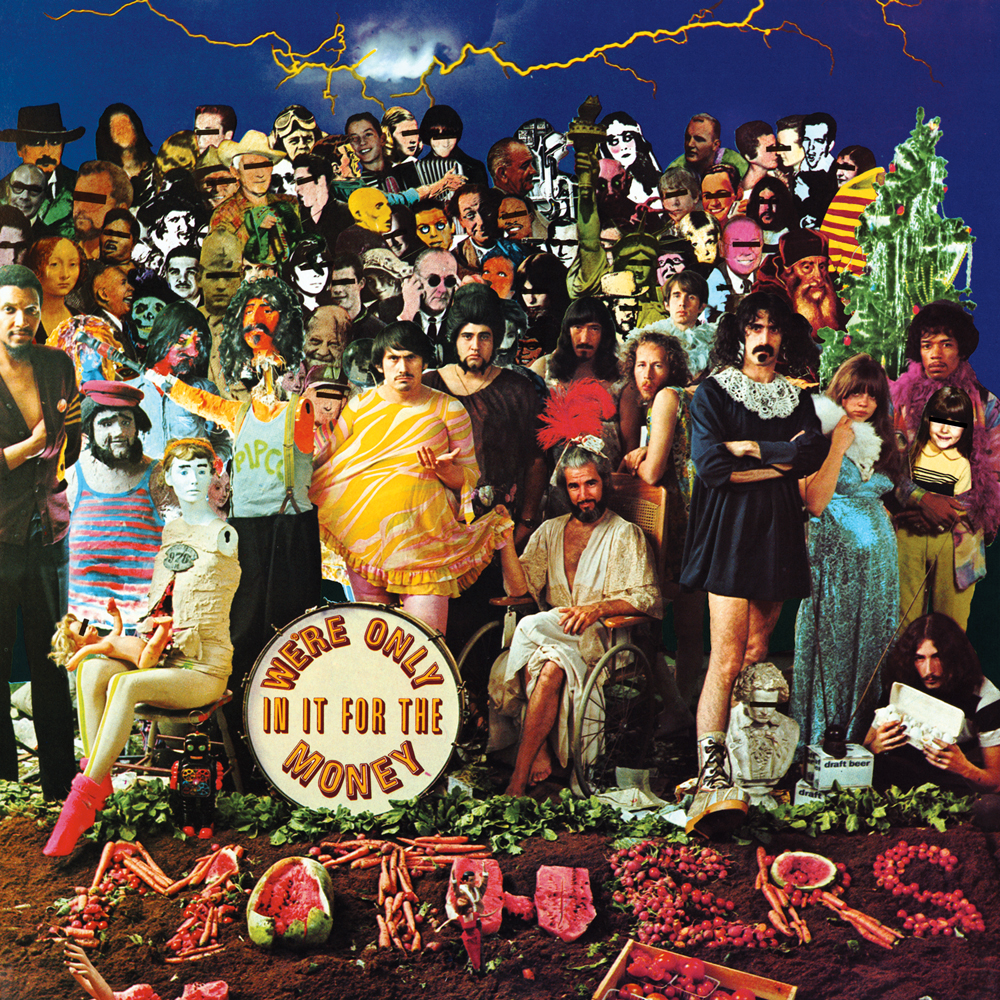This Picture of the Week showcases the emission nebula NGC 2313. The bright star V565 — surrounded by four prominent diffraction spikes — illuminates a silvery, fan-shaped veil of gas and dust, while the right half of this image is obscured by a dense cloud of dust. Nebulae with similar shapes — a star accompanied by a bright fan of gas — were once referred to as cometary nebulae, though the name is no longer used. The language that astronomers use changes as we become better acquainted with the Universe, and astronomical history is littered with now-obsolete phrases to describe objects in the night sky, such as “spiral nebulae” for spiral galaxies or “inferior planets” for Mercury and Venus.

Claude Hudson “Butch” Trucks (May 11, 1947 – January 24, 2017) was an American drummer. He was best known as a founding member of The Allman Brothers Band. Trucks was born and raised in Jacksonville, Florida. He played in various groups before forming the 31st of February while at Florida State University in the mid 1960s. He joined the Allman Brothers Band in 1969. Their 1971 live release, At Fillmore East, represented an artistic and commercial breakthrough. The group became one of the most popular bands of the era on the strength of their live performances and several successful albums. Though the band broke up and reformed various times, Trucks remained a constant in their 45-year career. Trucks died of a self-inflicted gunshot wound on January 24, 2017.
see full post...Eric Victor Burdon (born 11 May 1941) is an English singer-songwriter and actor. He was previously the vocalist of rock band The Animals and funk band War. He is regarded as one of the British Invasion‘s most distinctive singers with his deep, powerful blues-rock voice. He is also known for his aggressive stage performances. In 2008, he was ranked 57th in Rolling Stone‘s list The 100 Greatest Singers of All Time.
Eric Burdon was born in 1941 in Walker, Newcastle upon Tyne, England. His father, Matt, was originally from Tyneside. His mother, Rene, was originally from Ireland and moved to Scotland before settling in Newcastle in the 1930s. He also had a younger sister, Irene. Burdon later recalled that his middle name “Victor” had been chosen after encouragement from the Lord Mayor, who offered new mothers £25 if their new-borns were given a patriotic “war name”.
see full post...Carlos Eduardo Lyra Barbosa (born 11 May 1939) is a Brazilian singer and composer of numerous bossa nova and Música popular brasileira classics. He and Antonio Carlos Jobim, were the first two music composers, together with lyricists Vinicius de Moraes and Ronaldo Boscoli, to be recorded by João Gilberto on his first LP entitled Chega de Saudade (1959), which was called the first generation of Bossa Nova.
His first song to be recorded was “Menina” (1954), issued as a single by Sylvia Telles in 1955, with “Foi a noite” by Antonio Carlos Jobim on the other side of the record. The writers first met because of this single, when Jobim called Lyra “the other side of the record”. At that time, both were writing their own music and lyrics creating a colloquial and completely new style. They wrote about their own experiences and feelings. A completely different lyrical style from most songs written at that time.
His first compositions (music and lyrics), from 1954 to 1956 included: “Quando chegares”; “Menina”; “Barquinho de Papel”; “Ciúme”; “Criticando” and “Maria Ninguém”. In 1957 he started to compose together with the lyricist Ronaldo Bôscoli, songs such as “Lobo bobo”, “Saudade fez um samba” and” Se é tarde me perdoa”. In 1958 wrote “Aruanda” and “Quem quiser encontrar o amor”, with Geraldo Vandré. In 1960 he started to compose together with Vinicius de Moraes, songs such as “Você e eu”; “Coisa mais linda”, Sabe você?”, “Samba do Carioca”; “Maria Moita” and many others. They wrote together a musical play, in 1962, called “Pobre Menina Rica” (Poor little rich girl blue).
In 1961 he was one of the five founders of CPC (Center of Popular Culture) where he started to write songs for cinema and theater. He also wrote the song “Influência do Jazz”, one of the songs he sang at the Bossa Nova Concert at Carnegie Hall, in 1962. He continues to compose, record, and perform.
see full post...Carla Bley (born Lovella May Borg, May 11, 1936) is an American jazz composer, pianist, organist and bandleader. An important figure in the free jazz movement of the 1960s, she is perhaps best known for her jazz opera Escalator over the Hill (released as a triple LP set), as well as a book of compositions that have been performed by many other artists, including Gary Burton, Jimmy Giuffre, George Russell, Art Farmer, John Scofield and her ex-husband Paul Bley. Bley was born in Oakland, California, United States, to Emil Borg (1899–1990), a piano teacher and church choirmaster, who encouraged her to sing and to learn to play the piano, and Arline Anderson (1907–1944), who died when Bley was eight years old. After giving up the church to immerse herself in roller skating at the age of fourteen, she moved to New York at seventeen and became a cigarette girl at Birdland, where she met jazz pianist Paul Bley. She toured with him under the name Karen Borg, before she changed her name in 1957 to Carla Borg and married Paul Bley the same year adopting the Bley name. He encouraged her to start composing. The couple later divorced but she kept his surname professionally.
A number of musicians began to record Bley’s compositions: George Russell recorded “Bent Eagle” for his album Stratusphunk in 1960; Jimmy Giuffre recorded “Ictus” on his album Thesis; and Paul Bley’s Barrage consisted entirely of her compositions. Throughout her career, Bley has thought of herself as a writer first, describing herself as 99 percent composer and one percent pianist.
see full post...
Frederick Roach (May 11, 1931 – October 3, 1980) was an American soul jazz Hammond B3 organist born in The Bronx, New York, United States. Roach made his record debut in 1960 with saxophonist Ike Quebec on the albums Heavy Soul and It Might as Well Be Spring and played with Willis Jackson. From 1962-64 he recorded 5 albums as a leader for the Blue Note Records label and also recorded with Donald Byrd on the album I’m Tryin’ to Get Home. Roach’s original writing, steady basslines, and highly musical fleet-fingered right hand set him apart. From 1966-67 he recorded three more albums as a leader for Prestige Records, which are in a more commercial vein than his Blue Note dates. He left the music business in 1970 and became involved in theater, playwriting and film. Reportedly, he moved to California to the film industry, where he suffered a heart attack and died in 1980.
Roach was a soulful organist, certainly influenced by Jimmy Smith, but with a distinct sound and a quite original concept, which was perhaps best heard on “Good Move” for Blue Note. His Blue Note albums are critically acclaimed.
see full post...Clusters of stars can be near or far, young or old, diffuse or compact. The featured image shows two quite contrasting open star clusters in the same field. M35, on the lower left, is relatively nearby at 2800light years distant, relatively young at 150 million years old, and relatively diffuse, with about 2500 stars spread out over a volume 30 light years across. Bright blue stars frequently distinguish younger open clusters like M35. Contrastingly, NGC 2158, on the upper right, is four times more distant than M35, over 10 times older, and much more compact. NGC 2158’s bright blue stars have self-destructed, leaving cluster light to be dominated by older and yellower stars. In general, open star clusters are found in the plane of our Milky Way Galaxy, and contain anywhere from 100 to 10,000 stars — all of which formed at nearly the same time. Both open clusters M35 and NGC 2158 can be found together with a small telescope toward the constellation of the Twins (Gemini).

Donovan Phillips Leitch (born 10 May 1946) is a Scottish singer, songwriter and guitarist. He developed an eclectic and distinctive style that blended folk, jazz, pop, psychedelic rock, and world music (notably calypso). He has lived in Scotland, Hertfordshire (England), London, California, and since at least 2008 in County Cork, Ireland, with his family. Emerging from the British folk scene, Donovan reached fame in the United Kingdom in early 1965 with live performances on the pop TV series Ready Steady Go!.
Having signed with Pye Records in 1965, he recorded singles and two albums in the folk vein for Hickory Records (US company), after which he signed to CBS/Epic Records in the US – the first signing by the company’s new vice-president Clive Davis – and became more successful internationally. He began a long and successful collaboration with leading British independent record producer Mickie Most, scoring multiple hit singles and albums in the UK, US, and other countries.
He emerged onto the scene in 1965 with three UK hit singles: “Catch the Wind“, “Colours” and “Universal Soldier“, the last written by Buffy Sainte-Marie. In September 1966, “Sunshine Superman” topped America’s Billboard Hot 100 chart for one week and went to number two in Britain, followed by “Mellow Yellow” at US No. 2 in December 1966, then 1968’s “Hurdy Gurdy Man” in the Top 5 in both countries, then “Atlantis“, which reached US No. 7 in May 1969.
He became a friend of pop musicians including Joan Baez, Brian Jones and the Beatles. He taught John Lennon a finger-picking guitar style in 1968 that Lennon employed in “Dear Prudence“, “Julia“, “Happiness Is a Warm Gun” and other songs. His backing musicians included the Jeff Beck Group and John Bonham and John Paul Jones, who later rose to fame as members of Led Zeppelin. Donovan’s commercial fortunes waned after parting with Most in 1969, and he left the industry for a time.
Donovan continued to perform and record sporadically in the 1970s and 1980s. His musical style and hippie image were scorned by critics, especially after punk rock. His performing and recording became sporadic until a revival in the 1990s with the emergence of Britain’s rave scene. He recorded the 1996 album Sutras with producer Rick Rubin and in 2004 made a new album, Beat Cafe. Donovan was inducted into the Rock and Roll Hall of Fame in 2012 and the Songwriters Hall of Fame in 2014.
see full post...Jimmy Ponder (May 10, 1946 – September 16, 2013) was an American jazz guitarist.
When Ponder’s brother entered the military, he left his guitar, and Ponder picked it up. In his early teens he received lessons from the guitarist in a band for which he sang doo-wop. He was drawn to the jazz guitar he heard on the radio. While playing in a rhythm and blues band, he occasionally inserted a jazz solo. He considered hearing guitarist Thornel Schwartz an important part of his life, when Schwartz was playing with organist Jimmy McGriff. He was impressed by Pat Martino when he saw Martino in the Jack McDuff band. He also cited as influences George Benson, Kenny Burrell, and Rene Thomas, though none surpassed the impact of seeing Wes Montgomery.
He learned the guitar solo from “Daily Double” (Choice), the only 45 rpm single released by Charles Earland. When Earland performed in Pittsburgh, he invited Ponder to sit-in with the band and liked what he heard. Earland promised Ponder he could become a member of the band after he finished high school. Six months after graduating, he was hired by Earland.
He began playing with Earland at 17 and in the following years with Lou Donaldson, Houston Person, Donald Byrd, Stanley Turrentine, and Jimmy McGriff. He moved to Philadelphia and later New York City in the 1970s and recorded extensively as a leader. Since the late 1980s, he frequently returned to his hometown to perform with his trio of two other Pittsburgh musicians, Gene Ludwigand Roger Humphries. Ponder’s highest charting release was Somebody’s Child, which reached No. 3 on the JazzWeek airplay chart in 2007.
Ponder died of lung cancer in Pittsburgh at the age of 67 in September 2013.
see full post...Melvin Sokoloff (May 10, 1929 – February 2, 1990), known professionally as Mel Lewis, was an American jazz drummer, session musician, professor, and author. He received fourteen Grammy Award nominations.
Lewis was born in Buffalo, New York, to Russian-Jewish immigrant parents Samuel and Mildred Sokoloff. He started playing professionally as a teen, eventually joining Stan Kenton in 1954. His musical career brought him to Los Angeles in 1957 and New York City in 1963. In 1966 in New York, he teamed up with Thad Jones to lead the Thad Jones/Mel Lewis Orchestra. The group started as informal jam sessions with the top studio and jazz musicians of the city, but eventually began performing regularly on Monday nights at the famed venue, the Village Vanguard. In 1979, the band won a Grammy for their album Live in Munich. Like all of the musicians in the band, it was only a sideline. In 1976, he released an album titled Mel Lewis and Friends that featured him leading a smaller sextet that allowed freedom and improvisation.
When Jones moved to Denmark in 1978, the band became known as Mel Lewis and the Jazz Orchestra. Lewis continued to lead the band, recording and performing every Monday night at the Village Vanguard until shortly before his death from cancer at age 60. The band still performs on most Monday nights at the club. Today, it is known as the Vanguard Jazz Orchestra and has released several CDs.
https://www.youtube.com/watch?v=YOmA-1fds-g
see full post...“Mother” Maybelle Carter (born Maybelle Addington; May 10, 1909 – October 23, 1978) was an American country musician and originator of the ”Carter scratch.” She is best known as a member of the Original Carter Family act from the late-1920s until the early-1940s and was a member of the Carter Sisters and Mother Maybelle.
Maybelle Carter was born Maybelle Addington on May 10, 1909, in Nickelsville, Virginia. She was the daughter of Margaret Elizabeth (née Kilgore; 1879 – 1960) and Hugh Jackson Addington (1877 – 1929). According to family lore, the Addington family of Virginia is descended from former British prime minister Henry Addington, 1st Viscount Sidmouth. On March 13, 1926, Maybelle married Ezra Carter. They had three daughters, Helen, June and Anita.
She was a member of the original Carter Family, which was formed in 1927 by her brother-in-law A. P. Carter, who was married to her cousin Sara, also a part of the trio. The Carter Family was one of the first commercial rural country music groups. Maybelle, who played autoharp and banjo as well as being the group’s guitarist, created a unique sound for the group with her innovative ‘scratch‘ style of guitar playing, where she used her thumb to play melody on the bass and middle strings, and her index finger to fill out the rhythm. Her innovative technique, to this day known as the Carter Scratch, influenced the guitar’s shift from rhythm to lead instrument.
see full post...Márkos Vamvakáris (Greek: Μάρκος Βαμβακάρης; 10 May 1905 – 8 February 1972), was a rebetiko musician. He is universally referred to by rebetiko writers and fans simply by his first name, Márkos. The great significance of Vamvakaris for the rebetiko is also reflected by his nickname: the “patriarch of the rebetiko”.
Vamvakaris was born on 10 May 1905 in Ano Syros (or Ano Khora), Syros, Greece. He was the first of six children, while his family belonged to the sizeable Roman Catholic community of the island, the “Francosyrians”, a name deriving from the colloquial Greek reference to West Europeans collectively as “the Franks“. At the age of twelve, in the false belief that he was wanted by the police, Vamvakaris fled Syros for the port of Piraeus. He worked as a stevedore, a pit-coal miner, a shoe-polisher, a paperboy, a butcher, and other odd jobs. He heard a bouzouki player playing, and vowed that if he did not learn to play the instrument in six months he would chop off his own hand with a cleaver (he was working in the public abattoirs at the time). He learned bouzouki, becoming an innovative virtuoso player, and began to write songs of his own. At first he often played in clandestine hashish-smoking establishments known as tekés; later he and his band, which included Giorgos Batis, Anestis Delias and Stratos Pagioumtzis played in more legitimate clubs and taverns. They were extremely popular, and Markos made many recordings. His initial nickname among the rebetes was “the Frank” (Fragos).
see full post...
